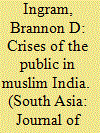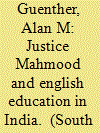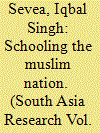|
|
|
Sort Order |
|
|
|
Items / Page
|
|
|
|
|
|
|
| Srl | Item |
| 1 |
ID:
140457


|
|
|
|
|
| Summary/Abstract |
This article argues that Sayyid Ahmad Khan (1817–98) and Ashraf ‘Ali Thanvi (1863–1943) were, respectively, exemplars of what I will call the liberal critique of custom on the one hand, and the Islamic legal critique of custom on the other. I argue that a range of overlapping semantic fields in their Urdu works—‘custom’ (rasm), ‘reform’ (islah), ‘decline’ (zawal, tanazzul) and ‘nation’ or ‘moral community’ (qawm), among others—opens up new lines of inquiry in comparing Aligarh and Deoband, typically treated as incommensurable in their views, as institutions and movements. I suggest, additionally, that ‘the public’ (‘amm) was a shared frame through which they envisioned implementing their respective projects. At the imagined centre of these publics, they located a new sort of Muslim: literate, self-regulating, self-fashioning, guided by rationality (‘aql) and free, above all, of the moral and social entanglements of ‘custom’.
|
|
|
|
|
|
|
|
|
|
|
|
|
|
|
|
| 2 |
ID:
103687


|
|
|
|
|
| Publication |
2011.
|
| Summary/Abstract |
This article traces the motif of English education in Justice Syed Mahmood's intellectual history and demonstrates the dialogical nature of knowledge formation in British India. While his own educational experience at Cambridge University had a profound and lasting impact on his own conception of the nature and purpose of education, Mahmood transformed and adapted that experiential knowledge to serve his predominant public concerns. He was increasingly committed to arresting the perceived decline in social standing, political influence and above all educational competence of the Muslim community in India. Seeing government service as the birthright of the ashraf Muslim classes, he encouraged the creation of institutions that would facilitate the training of young men from fine families to become effective bureaucrats in the government machinery of British India. In all these endeavours, Mahmood considered the promotion of English education to be the key to real progress for individuals and for the Muslim community.
|
|
|
|
|
|
|
|
|
|
|
|
|
|
|
|
| 3 |
ID:
005169


|
|
|
|
|
| Publication |
New Delhi, Har-anand Publications, 1994.
|
| Description |
290p.Hbk
|
| Standard Number |
8124101892
|
|
|
|
|
|
|
|
|
|
|
|
Copies: C:1/I:0,R:0,Q:0
Circulation
| Accession# | Call# | Current Location | Status | Policy | Location |
| 036155 | 923.554/TYA 036155 | Main | On Shelf | General | |
|
|
|
|
| 4 |
ID:
103689


|
|
|
|
|
| Publication |
2011.
|
| Summary/Abstract |
This article examines Muhammad Iqbal's critique of contemporary approaches towards Muslim education. In his writings, poetic and prose, Iqbal took on both the traditional religious authorities who administered the Madrasas and the modernists associated with the Aligarh College for failing to provide an education that was true to the 'national character' and to develop a synthesis of Islamic and western knowledge. While the former were criticised for ignoring modern intellectual developments, the latter were attacked for being intellectually captive to the West. At a broader level, this article employs Iqbal as a foil to debates over the empowering potential of western education. Iqbal's views are examined against the background of attempts by Muslim intel-lectuals to negotiate between the adoption of a universal modern education and the development of an educational system that kept Muslims grounded in Islam and their 'national character'. These negotiations took on a number of shapes, pedagogical and polemical as well as theological.
|
|
|
|
|
|
|
|
|
|
|
|
|
|
|
|
|
|
|
|
|